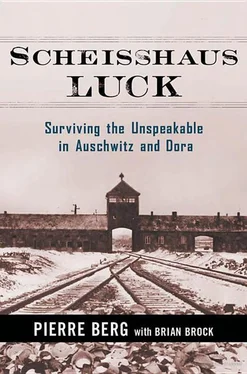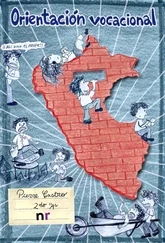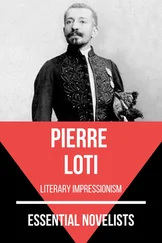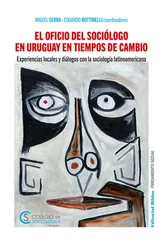A train rattled by.
“Water,” rasped a voice.
Another seconded the plea. Suddenly the familiar chant was echoing through the cars again, but by now no one expected the plea to be answered, and it faded quickly.
I stared at the planks covering the hole in the floor. With the train stopped, why hadn’t any of us thought of escaping? Were we that beaten down? I swore to myself that if nothing happened before daybreak I would ask for Stella’s forgiveness and lift those planks. If I got shot at least I could scoop a handful of snow into my mouth before I died.
I heard the distant sound of voices and barking dogs. Others heard them, too. Someone got up and looked out the window, but all he could see was darkness. The voices got louder. They were speaking German, no doubt about that, but it was impossible to make out what they were saying. The dogs began to feverishly yap as if on the hunt. The sound of cinders crunching under boots made me stiffen. Someone rattled a chain, then the door slid open. Frigid air burst in.
“ Raus! Wollt ihr raus! Alles raus verfluchte Hunde !” (Get out! Get out! Everyone out, you goddamn dogs!)
No one moved. None of us wanted to know what waited for us out there. An SS guard brandishing a truncheon climbed into the car and began swinging and kicking to stampede us out. I jumped to my feet and became dizzy, but fought the urge to sit back down.
Rousted from our collective stupor, we surged toward the exit with many belongings lost in our wake. The older men, their joints stiff from sitting, suffered most of the guard’s blows. There was a four-foot drop to the tracks, and many tried to lower themselves down, only to have their fingers stepped on by those behind them.
I leaped out and tumbled into a small gully.
The train was stretched out like a python with a reddish halo hovering over its head. Human beings were cascading pell-mell out of all the cars. Children shrieked and men and women howled as the stragglers were hurled off. Around me men floundered in the mud like netted fish.
An armed guard took a position near each car. SS guards with German Shepherds moved in and out of the gloom. The dogs’ growls kept me away from the patches of snow on the piles of coal and stacks of wooden ties. I overheard some women lamenting the “poor dears” who hadn’t survived the journey. Probably corpses in every car, I thought, but I was pretty sure no one had been left behind in ours.
Fog floated past the lights in the yard like wads of cotton batting. Over a loudspeaker, a German snapped orders.
“Women and children to the left! All men to the right! Leave all your belongings on the side of the track. They’ll be returned to you after your processing.”
Stella. I had to find Stella. As the guards began to separate us, I spotted a head of flowing red hair.
“Stella!” I called to her, but in the tumult she couldn’t hear me.
I had to catch her before she got into line. Water splashed into my shoes as I pushed through a swarm of clinging families. Slipping in the mud, I called after her again. She ducked past a guard waving his truncheon. I stopped. The girl was too tall. My heart sank. In the chaos and darkness there was no way I was going find her. It was hopeless, for now.
From the loudspeaker, one order followed another.
“All men over fifty years old will remain with the women. All those who cannot walk will go with the women. They will all ride in the trucks.” Why did the speaker’s voice seem to quiver as if he were trying to suppress laughter?
“All the doctors who are over fifty years old will remain with the men.”
Why must the old doctors walk? That didn’t make sense. Moving into line, an elderly man with a matted beard grabbed my forearm.
“What did they say?”
“I’m not sure,” I lied, too overwhelmed with foreboding to tell him the truth.
A weary Father Tonanti marched toward the swelling line of women and children.
“See you later,” he waved.
I waved back, holding tightly to his words. When he was out of earshot I realized I should have begged him to locate Stella and reassure her that I would find her.
“All men march past with hats off!”
A searchlight was turned on. In its luminous pencil appeared a tall, thin man in a dark green uniform. He climbed onto a small platform near the engine and our line slowly began to move. When each man passed in front of the platform, the officer scrutinized him, then waved his riding crop to the left or to the right. As I got closer I realized that he was triaging us into two groups. The men bunched on the left were either middle-aged or frail.
The officer’s profile was like that of a bird of prey. The silver death head on his cap gleamed in the harsh light. Three men in front of me, two, one—it was my turn. I stepped into the light. The officer bent slightly forward to see me better. Instinctively, I stood on my toes and puffed out my chest. With the spotlight shining in my eyes, it was impossible to distinguish his features except for the prominent Adam’s apple bobbing up and down. The buzzard studied his carrion carefully. He signaled for me to go to the right, and I joined a group of young and robust fellows on the other side of the tracks. I placed myself next to familiar faces.
“Fall out by fives,” commanded a soldier. The screening was finished.
The women, one of them Stella, disappeared into the fog along with their wails and pleas. A five-year-old girl came running toward us. “Poppa, Poppa, Poppa!”
Mordechai, a Turkish butcher from my hometown, barreled through our ranks. A guard grabbed his daughter by the arm before she could reach the tracks and dragged her back to her mother and six sisters. With hands preventing him from going any farther, Mordechai let out a disturbing groan. In Drancy I had asked him why he had fathered so many children. “If I had had a boy I would have stopped on the first one.”
With its whistle taunting us, our train began to back out. If I were religious, that would have been a good time to pray. Instead, I lit the cigarette that I had gotten from a new arrival to Drancy and eagerly breathed in the smoke. I hadn’t smoked it on the train because I didn’t have any to share.
The man beside me was shivering and his teeth were clattering.
Another one was beating his arms against his chest to keep warm. I wanted to stomp my feet, but my shoes were stuck in the mud. I moved my toes and thousands of steel needles shot up my stiff legs.
What the hell were we waiting for in this arctic dampness? Even with my layers of clothes the cold was penetrating the marrow of my bones. A guard yawned noisily. He looked bored to death. In the distance, the bell in a church tower struck twelve. If I were in Nice, I would probably be leaving the cinema with my pals and on my way home to my soft, warm bed.
A sentry passed by.
“Where are we?” I asked.
“Auschwitz,” the soldier said with a smirk.
What was the twisted smile for? Did I miss the joke? Well, it was a funny-sounding name. He was about to continue on his way when he realized I was smoking. He sprang on me, crushing the cigarette against my mouth with his gloved hand. The blow dropped me into the mud.
“ Rauchen verboten !” (No smoking!), he screeched.
When I got to my feet, icy water ran down my neck and dripped from my sleeves. Despite myself, tears filled my eyes. So this is “Pitchi Poi. ” I wiped the ashes from my lips. Oh, how I regretted not escaping with the others. What good had it done me to stay in that cattle car? I wasn’t reunited with Stella. I didn’t even get a glimpse of her. Filthy boches . It was obvious now that the Nazis had lied to us. There was never any plan to keep us all together. The whole time in Drancy they had lied, and instead of revolting en masse we had allowed ourselves to be led along like spineless cuckolds. I was standing ankle deep in mud, passively awaiting my fate.
Читать дальше












